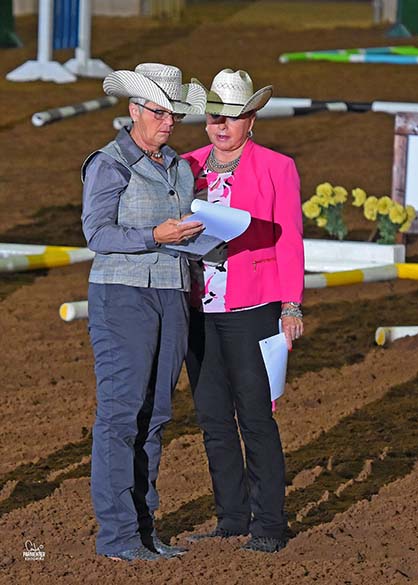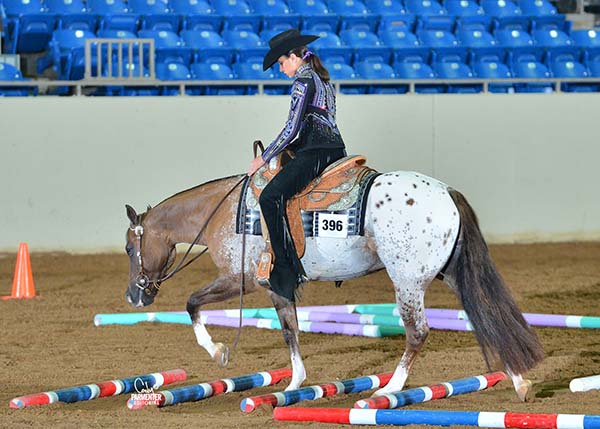So You Think You Can Be a Judge? 11.5 Hours of Trail Later…
By: Brittany Bevis
How would you like the chance to jet-set around the country, and even the globe, as a respected professional in your field, lending your expertise to judge the top horses and riders in the industry? And get paid to do it? Sounds like a pretty cushy job… on the surface.
Now, consider that you’d have to be onsite and ready to go from the very first class to the last, staying alert and focused to accurately score competitors from often only a cursory glance. Your placings determine the results. There’s no room for mistakes. No pressure…
We recently had the opportunity to speak with Tammy Denlinger-Lickliter, who holds seven judging cards with associations like NSBA, POA, IBHA, and ABRA and judges approximately 35 events a year. She was recently invited to judge the Ponies of the Americas National Congress in Tulsa, Oklahoma, where she and her fellow officials judged a marathon Trail day that ended up being 11 and a half hours long!
Tammy was hired specifically to judge the Hunter, English, and Trail classes at the show. She knew it was going to be a very large event, but hadn’t expected such marathon days. “While I have judged longer days, I had never judged 11 and a half hours of Trail before! But, the show committee was very efficient and let us know, in advance, what to expect.”
With 160 Trail runs to get through in one day, show management had a clear plan in place in order to make efficient time and to preserve the judges so they could devote their sole attention to scoring performances.
“The courses were well maintained by a great ring crew,” Tammy says. “The scribes were also extremely helpful and highly organized. All of the pieces were in place for a successful event. We did take a lunch and dinner break every day, and we had several quick breaks during drags, warm ups, or course resets both with Trail and during the English events. For the most part, we tried to keep things flowing smoothly.”
In today’s world, many people find it hard enough to focus on a single task for five minutes, let alone eleven and a half hours. Not to mention the fact that, when you’re a judge, Championships are literally determined by the stroke of your pen, so the pressure can be intense. Tammy has a practical approach when it comes to balancing duty with the fun of judging horse shows.
“Judging is my passion, and I try to treat the exhibitors the way I wanted to be treated when I was showing for a living,” she says. “The last run is just as important as the first, even with 160 Trail goes! Keeping everyone safe is always a big concern. And, for me, being as fair and professional as possible, while still KEEPING IT FUN is important. I enjoy interacting with the exhibitors a bit, especially the young ones. I want to help provide a positive experience for a novice exhibitor.”
With the AQHA Youth World Show beginning later this week, let’s take a look at the number of Trail runs that will be scored during the event.
- Trail 14-18 Preliminaries Level 3– 111
- Trail 14-18 Preliminaries Level 2– 50 + the 76 horses entered in both Level 3 and Level 2 that will run once
- Trail 13 and Under– 40
- Total Trail runs expected– 201 (not including the Trail 14-18 finals and Shootout)
What’s a judge’s biggest asset when officiating a large, scored event at a Championship-level show like the AQHA Youth World or POAC National Congress? A great scribe. “None of this would be possible without a good scribe,” she says. “I can’t emphasize that enough. Of course, everyone makes mistakes. The art is in trying to minimize error. The good scribes will split your ties and keep you aware of your top scores. They are life savers!”
In the October 2014 edition of The Equine Chronicle, Delores Kuhlwein wrote Confessions Of a First Year Scribe to give her fellow competitors an inside look at just how hard it is to be on the “other side of the ring.”
“The first day of Trail was expected to take 10 hours, outdoors, and was accompanied by strong bursts of cold wind. Meanwhile, I was attempting to flip back and forth between sheets that corresponded to the different classes in each block; it was a surprise I didn’t expect. Nonetheless, I persisted alongside the experienced scribes, wishing madly that I had their seat time in my repertoire and trying hard to play the role of a math whiz. Despite my inexperience, each horse and rider that entered the course felt like a breath of fresh air; every one was filled with promise at the start cone. The once unfamiliar set of pluses and penalties slowly became clear in my mind.
Following lunch, and more than six hours into the first 10 hour day of nothing but Trail, my mind began to wander as planes flew by and the tractor dragging the arena next door droned on like a cadenced lullaby meant to induce sleep. I jerked back to attention and shifted in my seat, but it was to no avail. I wondered how the judges could possibly concentrate for this long. Tick, tick, tick went the trail poles, and I numbly recorded the scores while praying the sheets wouldn’t blow off the table every time I moved my arm. Then, I knew the answer – caffeine. I nodded yes to the young man taking requests for coffee. Forty minutes later, my frantic worry now reflected on how the judges could stand having so few bathroom breaks. I managed to control the urge to bolt from my seat as the day wore on, finally settling into the groove of pluses and penalties.
After seven mind-numbing hours, my respect for the judges grew enormously as they scored each obstacle without fail. I suddenly understood how much knowledge and discipline their job really requires. They took the grueling day in stride while presenting themselves professionally.”
Click here to read more from Confessions of a First Year Scribe.
So, when you compete at the AQHA Youth World, NSBA World, Appaloosa World, APHA World, or Quarter Horse Congress this year, consider the time, concentration, and devotion to excellence that it takes to score, place, and officiate a world-caliber event, and appreciate the judges who do just that.












